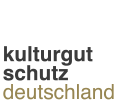Why do we protect cultural property?
Artistic goods differ from other goods in many respects. Alongside their inherent aesthetic value, works of art and cultural objects serve a communicative role, both in respect of a country’s own cultural self-understanding and in respect of cultural exchanges.
Culture is what makes us who we are – humans, Europeans, Germans, natives of the Rhineland or Thuringia, of Bavaria or Mecklenburg, of Hamburg or Berlin. Protecting the cultural heritage that holds up a mirror to our history and our identity forms part of our self-understanding as a nation of culture. At the same time, respect for one’s own cultural heritage serves as a foundation and starting point for respecting the objects that bear witness to the culture of other countries.
Germany is in the fortunate position of having established a system of state funding for cultural property which is unparalleled anywhere in the world, and which allows an almost unique density of cultural institutions. At the same time, it is often the financial support provided by private collectors and foundations or the loan agreements entered into by these latter that make art and culture publicly accessible to an extent that would never be possible through state funding alone.
The fact that we can expect and count on public access of this kind in 21st-century Germany is attributable not least to a widespread desire to give something back to society; the large number of “societies of friends” set up for German museums with collections of plastic and graphic arts serve as a good example of one way in which this affinity with art and culture is expressed.
Respect for cultural identity
Art and culture hold up a mirror to our social identity; as such, they merit not only funding, but also protection. Regardless of its market price, the intrinsic value of cultural property is particularly high when it reflects the history and cultural identity of a society – as in the case of Germany’s Nebra Sky Disc, for example. A particular goal pursued through the protection of cultural property is therefore to preserve cultural heritage against damage, destruction and unlawful removal from its habitual location, so that it can be passed on to future generations in an intact condition. Protection of this kind requires a legal framework and rules, however. The treatment of cultural property cannot be left solely to the market and its rules of supply and demand.
The protection of cultural property not only strengthens a country’s own cultural identity, but also boosts respect for the cultural heritage of other nations. Recognizing the value and significance of objects that bear witness to the cultural identity of one’s own community necessarily translates to respect for the objects that bear witness to the cultures of other nations. Since cultural objects always lay testimony to the progress of humanity as a whole, protecting these objects invariably benefits the general public.
As a basic principle, a distinction should therefore be drawn between two types of protection under the law on the protection of cultural property:
- protection of cultural property in Germany against expatriation abroad (national protection of cultural property); and
- protection of cultural property originating from other countries that has been unlawfully introduced into Germany from these countries and needs to be returned, and prevention of unlawful imports (international protection of cultural property).
The 2016 German Act on the Protection of Cultural Property (Kulturgutschutzgesetz, KGSG) and various provisions of EU and national regulations form the relevant legal framework for both types of protection in Germany.
There are also special legal provisions in place to preserve and safeguard the physical integrity of cultural goods. The authority primarily responsible for protecting cultural property during armed conflicts is the Federal Office of Civil Protection and Disaster Assistance (Bundesamt für Bevölkerungsschutz und Katastrophenhilfe, BBK). Protecting cultural property against natural disasters, however, is a core remit of the Länder (interior ministries). For details, see the section of the BBK website entitled “Protection of Cultural Property”.


